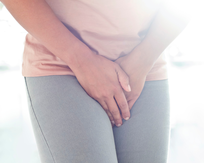|
You know that feeling when you buy a red car, you start seeing red cars everywhere. After meeting this patient and diving deep into her case, I learned even more about the complexities of IC and other pelvic inflammatory disorders. As that happened, more patients just like her began to contact the office and I began to see how common her story actually was. I'm to report after 6 months of receiving acupuncture and dry needling alongside natural supplements, the difference in pain levels and her frequency of flare ups has decreased immensely. Signs, Symptoms, and Conventional Medicine ApproachThe bladder is the organ in the human body that stores urine. When the bladder is full, it signals your brain that it’s time to urinate by communicating through the pelvic nerves. This is what creates the urge to urinate. With interstitial cystitis, there is something confusing the urinary bladder system. The person feels the need to urinate more often and with smaller volumes of urine than most people. The signs and symptoms of interstitial cystitis vary from person to person. If you have interstitial cystitis, your symptoms may also vary over time, periodically flaring in response to common triggers, such as menstruation, sitting for a long time, stress, exercise and sexual activity. Interstitial cystitis signs and symptoms may include:
The exact cause of interstitial cystitis isn’t known, but it’s likely that many factors contribute. For instance, people with interstitial cystitis may also have a defect in the protective lining (epithelium) of the bladder. A leak in the epithelium may allow toxic substances in urine to irritate your bladder wall. Other possible but unproven contributing factors include an autoimmune reaction, heredity, infection or allergy. These factors are associated with a higher risk of interstitial cystitis:
According to Chinese Medicine...According to Chinese medicine, not all people who develop IC get the condition from the same root causes. Acupuncture and Traditional Chinese Medicine work by correcting imbalances in the body and reset the body to bring it back to health. I like to think of this as hitting the reset button. For the treatment of Interstitial Cystitis, acupuncture can reduce the pain, frequency and discomfort of urination, along with the stress that can come with it. Common imbalances for Interstitial Cystitis include qi weakness, qi stagnation (lack of circulation of qi), and heat. It is not uncommon for people to suffer from more than one of these imbalances and it is important to locate which imbalance is particular to your situation so as to better guide the course of treatment. This is why it is important during the initial visit, to take an in-depth history of your symptoms to get a clear picture of what you are experiencing. Imbalances will correlate with specific symptoms. For example, people with qi weakness, or lack of energy, are often tired and have digestive problems. Those with qi weakness may experience frequent urination, urination at night, and a feeling of fullness in the abdomen. Qi stagnation is a lack of circulation of the energy and can cause pain, bloating, and muscle spasms. Heat in the body can cause dryness, burning urination, abnormal sweating, stiff joints, and headaches. Other relevant symptoms when designing a specific and effective course of treatment for IC are muscle tightness in the pelvis, back, abdomen, and legs. This is where Dry Needling can be so effective. Trigger points in the gluteus maximus and medius, adductor magnus, and illopsoas, are taken into account because they can produce pain in the pelvic floor. Another common symptom of IC is sacro-iliac joint dysfunction, which can also be an important factor in treatment. If you've been suffering from IC or other pelvic inflammatory disorders, contact us and we can see if a holistic approach is right for you.
0 Comments
Leave a Reply. |
Archives
December 2023
Categories
All
|
Proudly powered by Weebly


 RSS Feed
RSS Feed